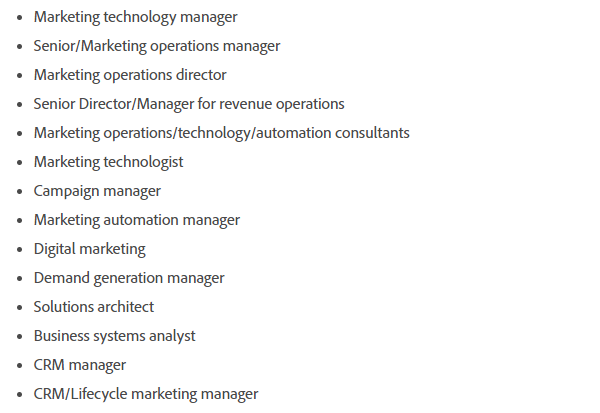Adobe AD0-E556 and AD0-E560 exams’ intended audience are below.

News from Adobe’s official website, the AD0-E556 exam will be retired on October 31, 2023, and the new upgrade test is AD0-E560. Let me show you the differences between Adobe AD0-E556 and AD0-E560 exams.
| AD0-E556 Exam | AD0-E560 Exam |
| Level: Master (3-5 years experience) Passing Score: 30/50 Time: 150 mins Delivery: Online proctored (requires camera access) Available languages: English Cost: $225 (global)/$150 (India) |
Level: Master (3-5 years experience) Passing Score: 30/50 Time: 100 mins Delivery: Online proctored (requires camera access) Available languages: English Cost: $225 (global)/$150 (India) |
| Section 1: Project Leadership (16%) Section 2: Marketo Engage Architecture Design (48%) Section 3: Reporting and Attribution (20%) Section 4: Advanced Operations (16%) |
Section 1: Project Leadership (16%) Section 2: Marketo Engage Architecture Design (48%) Section 3: Reporting and Attribution (20%) Section 4: Advanced Operations (16%) |
From the above information in the table, AD0-E560 exam has less time than AD0-E556. Besides, there is no change in the exam topics.
To be considered for this role, you must possess the following:
Current certification as an Adobe Marketo Engage Business Practitioner Certified Expert (require to pass AD0-E559 exam).
A minimum of five years of hands-on experience, preferably with diverse instances of Adobe Marketo Engage.
Proficiency in articulating the business implications of solutions to stakeholders across technical and non-technical levels.
The capability to conceptualize solutions and translate them into a Marketo Engage architecture, with a keen understanding of how integrations impact business processes.
Familiarity with the fundamental principles of architecting a Marketo Engage instance.
Furthermore, familiarity with the following tools and technologies is essential:
Adobe Marketo Engage features, functionality, and applications.
Database systems.
API connectivity.
CRM platforms.
Marketing technology platforms.
Adobe AD0-E556 and AD0-E560 exams’ intended audience are below.
